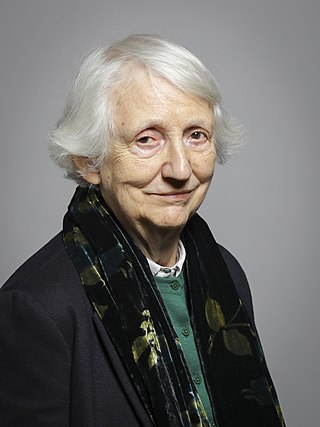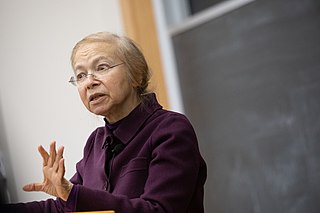
Christine Marion Korsgaard, is an American philosopher who is the Arthur Kingsley Porter Professor of Philosophy Emerita at Harvard University. Her main scholarly interests are in moral philosophy and its history; the relation of issues in moral philosophy to issues in metaphysics, the philosophy of mind, and the theory of personal identity; the theory of personal relationships; and in normativity in general.

John Henry McDowell, FBA is a South African philosopher, formerly a fellow of University College, Oxford, and now university professor at the University of Pittsburgh. Although he has written on metaphysics, epistemology, ancient philosophy, nature, and meta-ethics, McDowell's most influential work has been in the philosophy of mind and philosophy of language. McDowell was one of three recipients of the 2010 Andrew W. Mellon Foundation's Distinguished Achievement Award, and is a Fellow of both the American Academy of Arts & Sciences and the British Academy.

Virtue ethics is an approach to ethics that treats the concept of moral virtue as central. Virtue ethics is usually contrasted with two other major approaches in ethics, consequentialism and deontology, which make the goodness of outcomes of an action (consequentialism) and the concept of moral duty (deontology) central. While virtue ethics does not necessarily deny the importance of goodness of states of affairs or moral duties to ethics, it emphasizes moral virtue, and sometimes other concepts, like eudaimonia, to an extent that other ethical dispositions do not.
In moral philosophy, deontological ethics or deontology is the normative ethical theory that the morality of an action should be based on whether that action itself is right or wrong under a series of rules and principles, rather than based on the consequences of the action. It is sometimes described as duty-, obligation-, or rule-based ethics. Deontological ethics is commonly contrasted to consequentialism, virtue ethics, and pragmatic ethics. In this terminology, action is more important than the consequences.

Onora Sylvia O'Neill, Baroness O'Neill of Bengarve, is a British philosopher and a crossbench member of the House of Lords.

Sir Bernard Arthur Owen Williams, FBA was an English moral philosopher. His publications include Problems of the Self (1973), Ethics and the Limits of Philosophy (1985), Shame and Necessity (1993), and Truth and Truthfulness (2002). He was knighted in 1999.

Kantianism is the philosophy of Immanuel Kant, a German philosopher born in Königsberg, Prussia. The term Kantianism or Kantian is sometimes also used to describe contemporary positions in philosophy of mind, epistemology, and ethics.
Paul Guyer is an American philosopher and a leading scholar of Immanuel Kant and of aesthetics. Since 2012, he has been Jonathan Nelson Professor of Philosophy and Humanities at Brown University.

Kantian ethics refers to a deontological ethical theory developed by German philosopher Immanuel Kant that is based on the notion that: "It is impossible to think of anything at all in the world, or indeed even beyond it, that could be considered good without limitation except a good will." The theory was developed in the context of Enlightenment rationalism. It states that an action can only be moral if (i) it is motivated by a sense of duty and (ii) its maxim may be rationally willed a universal, objective law.
Julia Elizabeth Annas is a British philosopher who has taught in the United States for the last quarter-century. She is Regents Professor of Philosophy Emerita at the University of Arizona.
Robert L. Holmes is a Professor Emeritus of Philosophy at the University of Rochester, and an expert on issues of peace and nonviolence. Holmes specializes in ethics, and in social and political philosophy. He has written numerous articles and several books on those topics, and has been invited to address national and international conferences.

Frances Myrna Kamm is an American philosopher specializing in normative and applied ethics. Kamm is currently the Henry Rutgers University Professor of Philosophy and Distinguished Professor of Philosophy at Rutgers University in New Brunswick, New Jersey. She is also the Littauer Professor of Philosophy and Public Policy Emerita at Harvard University's John F. Kennedy School of Government, as well as Professor Emerita in the Department of Philosophy at New York University.
Alan Harry Donagan was an Australian/American philosopher, distinguished for his theories on the philosophy of history and the nature of morality.

Paul Walter Franks is the Robert F. and Patricia Ross Weis Professor of Philosophy and Judaic Studies at Yale University. He graduated with his PhD from Harvard University in 1993. Franks' dissertation, entitled "Kant and Hegel on the Esotericism of Philosophy", was supervised by Stanley Cavell and won the Emily and Charles Carrier Prize for a Dissertation in Moral Philosophy at Harvard University. He completed his B.A and M.A, in Philosophy, Politics and Economics at Balliol College, Oxford. Prior to this, Franks received his general education at the Royal Grammar School, Newcastle, and studied classical rabbinic texts at Gateshead Talmudical College.
Allen William Wood is an American philosopher specializing in the work of Immanuel Kant and German Idealism, with particular interests in ethics and social philosophy. One of the world’s foremost Kant scholars, he is the Ruth Norman Halls professor of philosophy at Indiana University, Ward W. and Priscilla B. Woods Professor, Emeritus, at Stanford University, and has held professorships and visiting appointments at numerous universities in the United States and Europe. In addition to popularising and clarifying the ethical thought of Kant, Wood has also mounted arguments against the validity of trolley problems in moral philosophy.

Virginia Potter Held is an American moral, social/political and feminist philosopher whose work on the ethics of care sparked significant research into the ethical dimensions of providing care for others and critiques of the traditional roles of women in society.

Amélie Oksenberg Rorty was a Belgian-born American philosopher known for her work in the philosophy of mind, history of philosophy, and moral philosophy.
Rae Helen Langton, FBA is an Australian-British professor of philosophy. She is currently the Knightbridge Professor of Philosophy at the University of Cambridge. She has published widely on Immanuel Kant's philosophy, moral philosophy, political philosophy, metaphysics, and feminist philosophy. She is also well known for her work on pornography and objectification.
Marcia Baron is an American philosopher and the Rudy Professor of Philosophy at Indiana University Bloomington. Her main research interests include moral philosophy, moral psychology, and philosophical issues in criminal law. Baron is an associate editor of Inquiry, a member of the editorial board of The International Encyclopedia of Ethics, a series editor for New Directions in Ethics, and a member of the editorial board of the North American Kant Studies in Philosophy.

Helga Varden is a Norwegian-American philosopher and Professor of Philosophy and Gender and Women Studies at the University of Illinois at Urbana-Champaign. She was Brady Distinguished Visiting Professor in Ethics and Civic Life at Northwestern University between 2014-2015. She is known for her works on Kantian philosophy.













